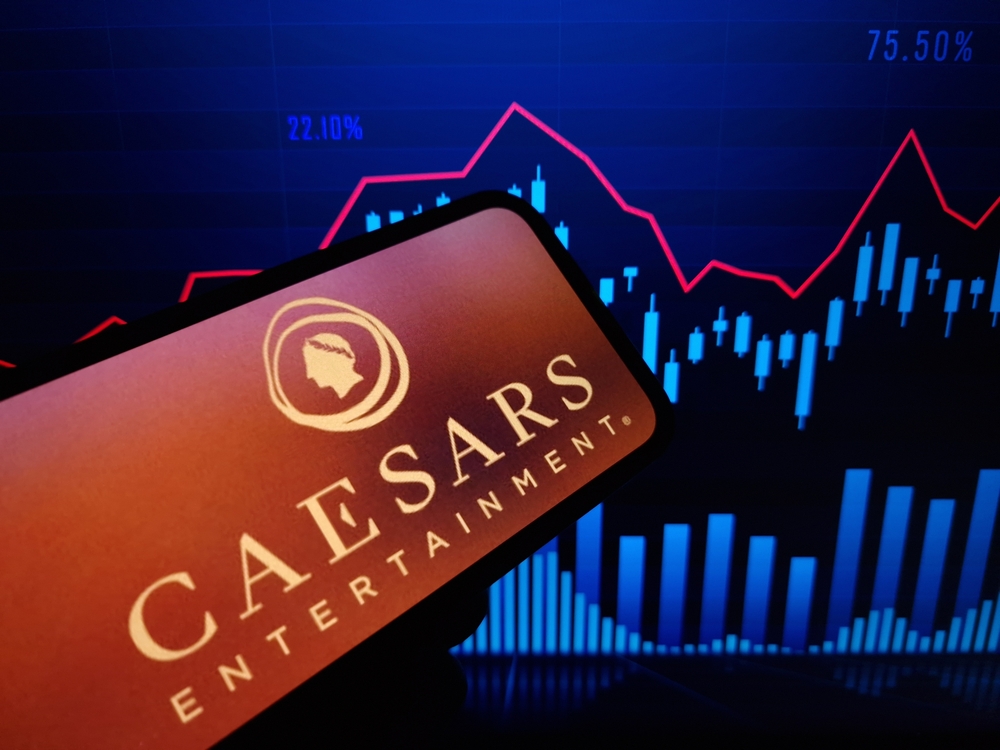Caesars Entertainment is having a spectacular run of bad luck. Today (September 22), the Las Vegas-born gambling giant was officially demoted from the prestigious S&P 500 index–replaced by none other than Robinhood–and reassigned to the S&P SmallCap 600 rankings. For a company that once stood among America’s corporate heavyweights, this is a striking fall from grace, and it’s not the only cloud on the horizon.
In recent days, Caesars has also been hit with a fine in Michigan over a multimillion-dollar system failure and has watched its Times Square casino dream collapse.
Fall From Grace
Caesars first joined the S&P 500–which tracks the stock performance of 500 leading companies listed on stock exchanges in the U.S.–in March 2021, a milestone that saw the company’s value peak at just under US$20 billion (£14.2bn) and rank among America’s largest companies.
But after its market value sank to approximately US$5.4 billion (£4bn)–well below the current US$22.7 billion (£16.8bn) benchmark for inclusion–the once larger-than-life market player was removed, only to be replaced by Robinhood, the events-contract trading platform of the moment, which, in partnership with Kalshi, offers sports trading in all 50 states.
Caesars’ reassignment to the S&P SmallCap 600–a designation for companies with a market capitalisation of between US$1.2 billion (£890m) and US$8 billion (£5.93bn)–not only dents the company’s prestige but will likely affect its stock prices and trading activity. It now trails behind major rivals, including Las Vegas Sands, Wynn Resorts and MGM Resorts, all of which continue to hold a firm grip on their top-500 rankings.
Million Dollar Blunder
And that’s just the start of matters. Caesars’ market woes were further compounded by a scandal in Michigan, which prompted the Michigan Gaming Control Board (MGCB) to issue the company with a US$100,000 (£74,100) sanction.
The case dates back to 2023, when over 16 days, Michigan resident Jeffrey Saco, 38, exploited a “systems vulnerability” on Caesars’ iGaming and sports betting platform to make 115 “fictitious deposits”, totalling US$2.1 million (£1.56m).
The shocker: Saco didn’t complete a single bank transaction.
In just over two weeks, he placed 10,000 bets totalling an eye-watering US$88 million (£65.1m) and even managed to cash out US$521,000 (£386,061) before anyone took note.
Saco pleaded guilty in April to one count of illegal gambling, served a three-month jail sentence, and agreed to restitution payments – some relief for Caesars.
But the MGCB didn’t drop the matter there.
Despite Caesars’ self-reporting of the issue, the regulator concluded the company had violated state gambling regulations by allowing unsecured deposits and failing to uphold technical and security standards, resulting in a US$100,000 (£74,100) settlement between the two parties.
Times Square Vetoed
If Wall Street woes and regulatory troubles in Michigan weren’t enough, residents of New York dealt the final blow last week as the company’s ambitious US$5.4 billion (£4bn) bid for one of the state’s three new casino licences was rejected by the Community Advisory Committee.
The proposal, which would have brought a new casino to Times Square–redeveloping 1515 Broadway–left locals concerned over congestion and the risk of undermining the “unique character” of the theatre district, which ultimately led them to veto the project.
What’s next for Caesars?
Hopefully, better luck with its next gamble.




